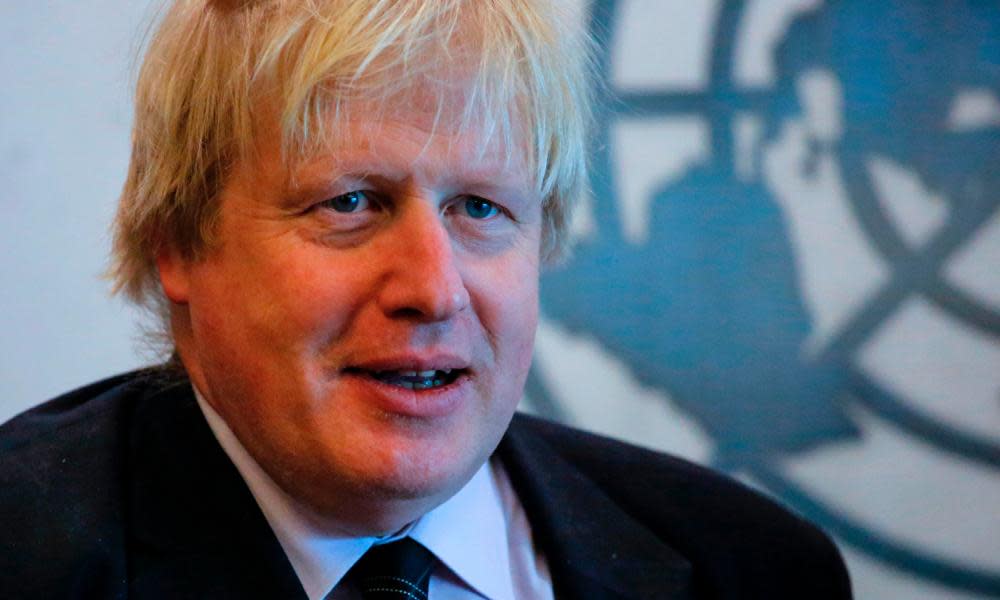British MPs say Turkish president using attempted coup to suppress human rights

The Commons foreign affairs select committee has accused the Turkish president, Recep Tayyip Erdoğan, of using an attempted military coup last summer to purge opponents and suppress human rights as the foreign secretary, Boris Johnson, embarks on the first full day of a goodwill visit to the country.
The committee’s report, published on Saturday, says the government is right to engage but warns that the UK’s approach to Erdoğan could damage its international reputation and weaken declining human rights in Turkey.
It said Ankara’s response to the attempted coup was neither necessary or proportionate, arguing that the scale of the systematic abuse of human rights and lack of a free press in the country made it difficult to see how a referendum next month to extend Erdoğan’s presidential powers could be seen as credible.
The report comes as Johnson and the foreign office minister Sir Alan Duncan visit Turkey in an attempt to cement UK trade and strategic ties with a country increasingly at odds with other European leaders.
The UK has been the EU state most sympathetic to the Turkish government since the coup attempt and also backed Erdoğan’s claims that the coup was masterminded by a network of supporters of the exiled cleric Fethullah Gülen.
In contrast to Dutch and German hostility towards Turkish ministers seeking to hold pro-Erdoğan rallies on their soil, Johnson has said he would welcome them to the UK.
But given the unexpectedly critical tone of the report, Johnson will have to work to reassure Ankara about the broadness of British support.
In potentially its most damaging finding the report challenges the validity of the referendum, saying: “It is difficult to foresee a fair, free and credible referendum when media, opposition MPs and civic organisations critical of the government have been closed down or silenced.”
It condemns Erdoğan’s response to the coup attempt, which has seen tens of thousands of teachers and civil servants sacked as well as military personnel jailed, and says the government has sought to clamp down on dissent.
“There is a fundamental intolerance of alternative narratives in Turkey, with the government broadly suppressing, discrediting or punishing those who contradict its authorised accounts of sensitive events,” the MPs said.
“The powers afforded by the state of emergency – combined with a vaguely framed definition of terrorism, a pliant media, and a politicised judiciary – have allowed the government to silence a broad spectrum of critics by labelling them as ‘Gülenists’ or ‘terrorists’ on the basis of light evidence or broad interpretations.”
The report said it had not found the Turkish government’s account of a Gülenist plot to be “substantiated by hard, publicly available evidence” yet noted the Foreign Office “seems willing to accept [it] broadly at face value”.
“Nine months after the coup attempt, neither the UK nor Turkish governments can point us to one person who has been found guilty by a court of involvement in the coup attempt, let alone anyone being found guilty with evidence of involvement with Gülenist motives.”
It warned that the UK risked “de-prioritising its concern for human rights in its drive to establish a strategic relationship with Turkey” and said the country should be added to the Foreign Office list of countries deemed as a human rights concern.
In a sweeping condemnation, the committee said civilian suffering in the resurgent conflict between the Turkish state and Kurdish militants, freedom of expression and assembly, judicial independence and restrictions on civil society organisations had all worsened since the coup attempt.
“Once held up as an example to the region, Turkey’s democracy and democratic culture are under severe pressure,” the report concluded. It said it was not the UK’s role to tell the Turkish people how to vote, but while the “wrong choices have the potential to deliver catastrophe well beyond Turkey’s borders ... The right choices would cement Turkey’s position as a liberal, democratic state which provides a philosophical and ideological bridge between west and east.”
In defence of Turkey, the committee point out the EU has not kept its part of the deal on slowing migration from Turkey, and says the UK is right to seek wider post-Brexit deals.
It also suggests some of the UK government motivation is to secure a major arms deal between BAE systems and Turkish Aerospace – the TF-X a new generation combat aircraft for the Turkish military.
The Foreign Office said that the report overall praised the government’s engagement with Turkey, adding: “We recognise the challenges that Turkey faces and we condemned last July’s coup attempt, which was a shocking attack on Turkish democracy.
“We have always said that the Turkish government’s response to the coup attempt must be measured. The UK consistently raises human rights issues with our Turkish counterparts.”

 Yahoo News
Yahoo News 
